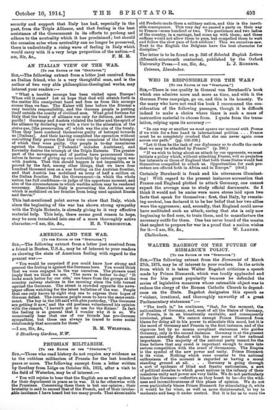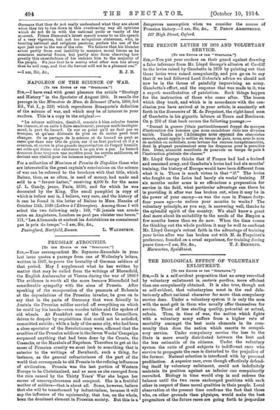WALTER BAGEHOT ON THE FUTURE OF BISMARCK'S POLICY.
[To THE EDITOR OF THE "SPECTATOR."] Sin,—The following extract from the Economist of March 27th, 1875, may be of interest to your readers. In the article from which it is taken Walter Bagehot criticizes a speech made by Prince Bismarck, which was loudly applauded and won for him great popularity because he defended the series of legislative measures whose ostensible object was to reduce the clergy of the Roman Catholic Church to depend- ence on the State. Bagehot designates this speech as "violent, irrational, and thoroughly unworthy of a great Parliamentary statesman" :— " The truth is," he continues, "that, for the moment, the nationalism of Germany, and, most of all the States of Germany, of Prussia, is in an unnaturally excitable, and consequently irrational, phase. We cannot exempt Prince Bismarck from blame for doing all in his power to stimulate this mood, but it is the mood of Germany and Prussia in the first instance, and of the vigorous but by no means compliant statesman who guides Germany, only in the second instance. Germany is at the present moment absurdly flushed with the new sense of her national importance. The majority of the national party cannot for the time believe that any creed is important enough to come into serious competition with the creed of Germanism. The Empire is the symbol of the new power and unity. Prince Bismarck is its voice. Nothing which runs counter to the national enthusiasm of the moment is regarded as having a moral standing ground at all. .. Germany is going through a sort of epidemic of blind and frantic nationalism, a sort of political measles to which great nations in the infancy of their conscious unity and power are very liable. We do not particularly blame the Germans—reflective as they boast to be—for the wild- ness and inconsiderateness of this phase of opinion. We do not even particularly blame Prince Bismarck for stimulating it, while it would be far wiser, as well as more disinterested, to try to moderate and keep it under controL But it is for us to warn the Germans that they do not really understand what they are about when they try to run down in this overbearing way all opinions which do not fit in with the national pride or vanity of the moment. Prince Bismarck's latest speech seems to us the speech of a very vigorous, but not too scrupulous statesman, who, in treating national and religious passions, prefers the use of the spur just now to the use of the rein. We believe that his blunder arises partly from real inability to measure moral forces as he measures material forces, but partly also from observing how greatly this onesidedness of his endears him to the majority of the people. We fear that he is sowing what other men less strong than he will reap, and that the harvest will not be a pleasant one."



































 Previous page
Previous page